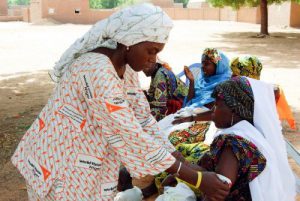by Emily Johnson
Growing up, I was a small child. Healthy-looking to any passerby, I was active, hyper, wide-eyed, and smiley but again, noticeably, even exaggeratedly, smaller than other kids. I was short and scrawny, with knobby arms and legs.
I ate a lot during childhood, anything in arm’s reach— vegetables, red meats, starches, fruits, glasses and glasses of milk, vitamins and liquid ferritin (iron), water like a race horse for over a decade— but my growth spurt wasn’t coming.
As I got older, I developed symptoms, enough to make a constellation, ranging from constant intestinal pain and bloating to rashes, migraines and depression and extreme physical and mental fatigue. Doctors chalked it up to iron deficiency and being a teenager who ran herself into the ground. I had all the resources a child needs to be healthy, but I was nowhere near it.

Empower a woman, empower a community. Over the years, child health in Niger has seen slight improvement in part because of community awareness sessions which Nigerien women attend faithfully.
The eventual answer I found, at the age of twenty, is that children with Celiac disease do not absorb the nutrients they take in. Because it took twenty years for a specialist to realize my body’s systemic failure, my intestines were unable to take in the nutrients of the food I ate, in order to then build and sustain my body
Safe, clean water is essential to a functional public health system and having clean water was something needed by me along with nutrients growing up. Although my condition would not have significantly improved if I had safe water or not, for the majority of children growing up in the developing world, clean water is essential for starting off life in a healthy way.
When we relinquish responsibility for failed clean water programs, public health is unattainable. When water sanitation is removed from the public health sector, water becomes a privilege rather than a right.

Women with their children in Niger.
Health must be viewed as a system with many interconnected parts. A functional health system cannot be achieved without easy public access to a reliable source of clean water and sanitation services for all. In other words, if an individual does not have safe and accessible clean water, seeing as many doctors and specialists as possible will not resolve health problems.

